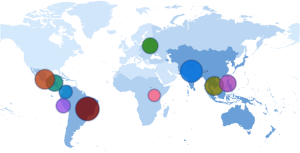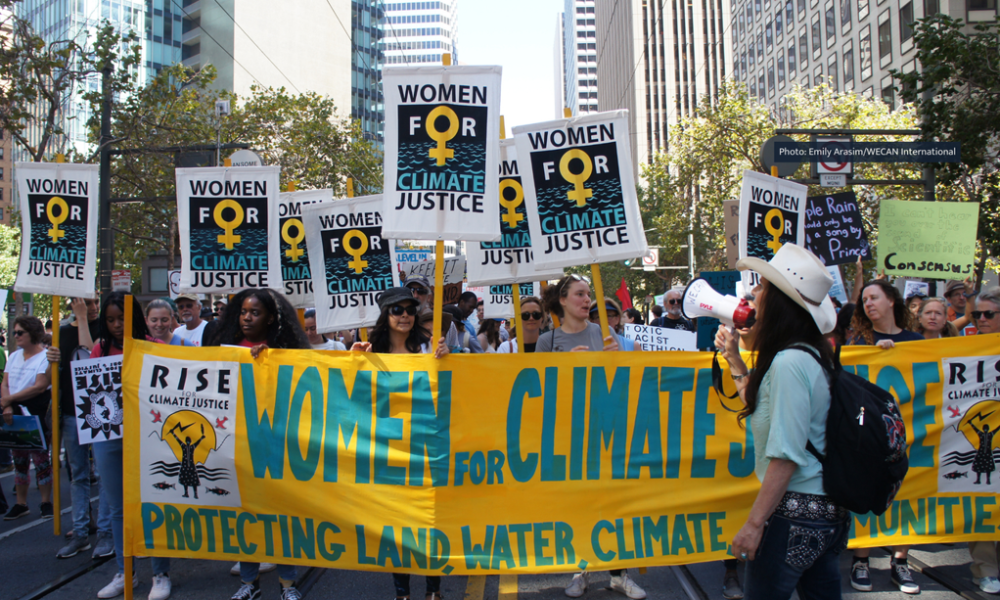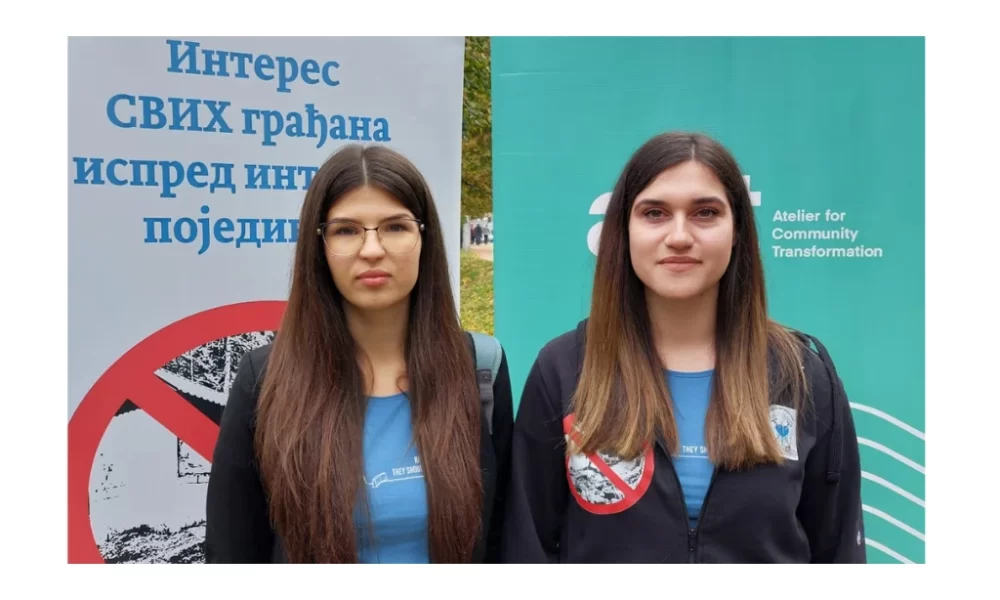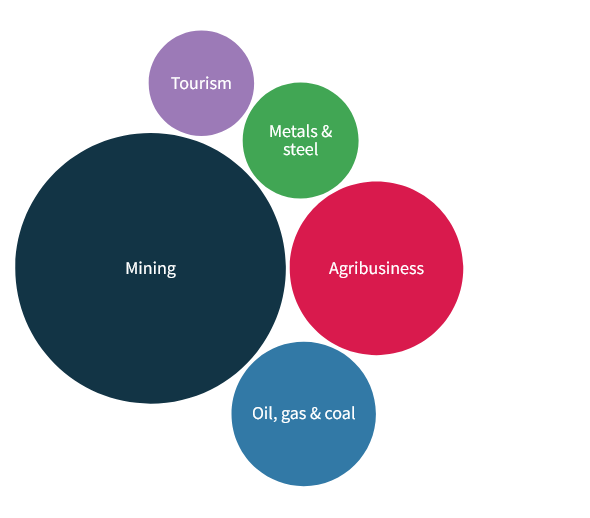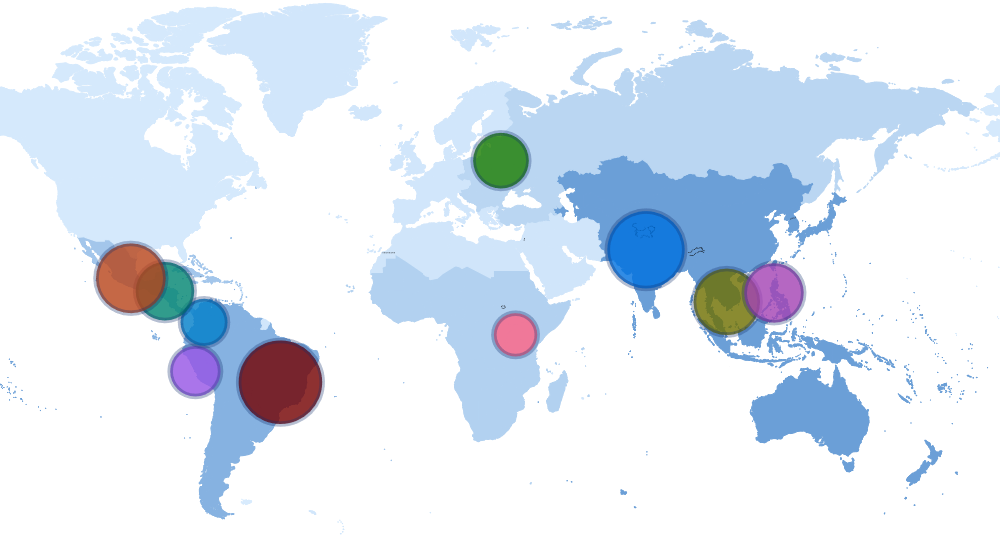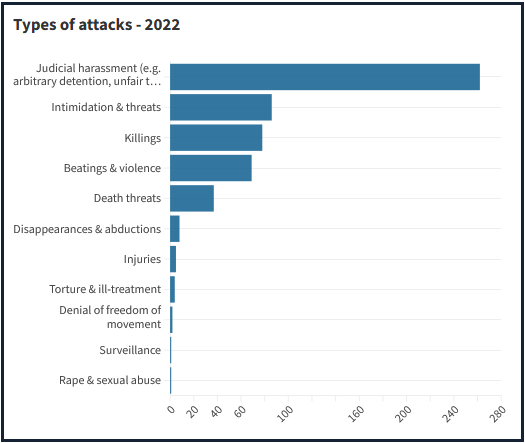NGO WORK
Human rights defenders & business in 2022: People challenging corporate power to protect our planet.
Published
3 years agoon
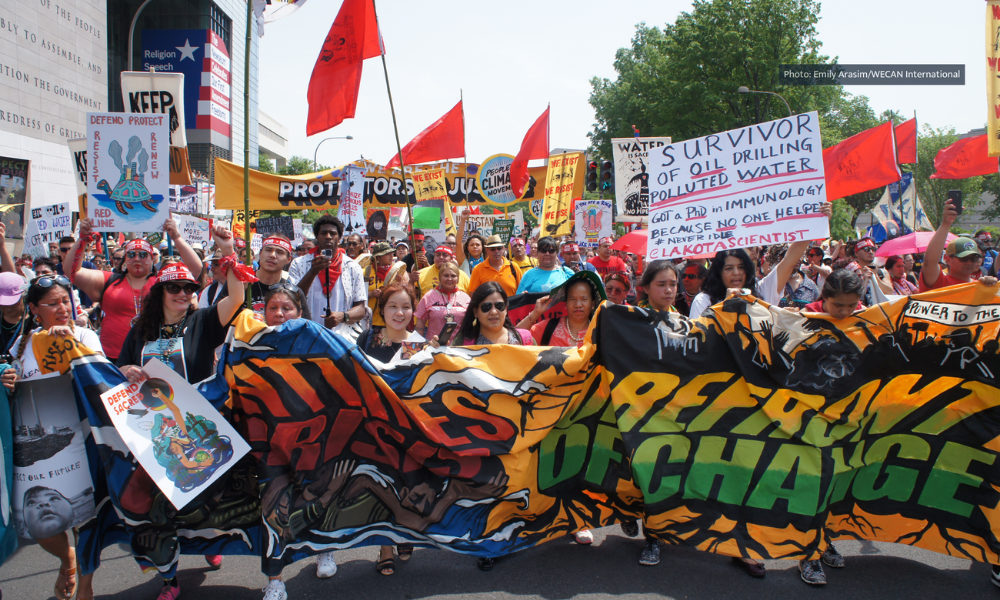
“All over the world the positive achievements of human rights defenders too often go unrecognised. Defenders are targeted because they confront powerful vested interests by protecting our natural resources and shared climate, defending labour rights, exposing corruption, and refusing to accept injustice. As we mark the 25th anniversary of the Declaration on Human Rights Defenders, States can and should do more to protect defenders, including by passing mandatory human rights and environmental due diligence legislation that requires businesses to engage in ongoing, meaningful engagement with defenders and other stakeholders.
– Mary Lawlor, UN Special Rapporteur on the situation of Human Rights Defenders
Every day, people across the globe are taking action to protect their communities, environments, and livelihoods from irresponsible business practice and demanding that companies uphold their responsibility to respect human rights, sometimes at great personal cost. Our data tracking attacks against these human rights defenders reveals the majority are against people raising concerns about harm to our shared environment.
This includes community members using direct action to stop logging in conservation areas in Malaysia, Indigenous leaders in Mexico protecting rivers and local biodiversity from harms caused by hydroelectric projects, and journalists reporting on environmental pollution in Serbia.
Despite the significant challenges they face, defenders are achieving victories worldwide. In 2022 defenders in Sierra Leone successfully advocated for a new law protecting customary land rights and banning industrial development in protected and ecologically sensitive areas; environmental justice groups in Louisiana’s “cancer alley” in the United States halted two large petrochemical projects; garment workers in Pakistan’s Sindh province won a 40% increase in minimum wage; women human rights defenders were elected to senior political positions in Brazil and Colombia, and after years of advocacy by Indigenous women leaders and organisations, the Committee on the Elimination of Discrimination Against Women adopted General Recommendation 39 on Indigenous Women and Girls – the first language in a binding international treaty focused on the rights of Indigenous women and girls.
As we mark the 25th anniversary of the Declaration on Human Rights Defenders, we celebrate the courage, creativity, and commitment of these people, organisations, and communities across the globe who are protecting our rights and shared planet.
Yet, human rights defenders continue to face intolerable levels of risk and harm. In their vital work to promote human rights and protect the environment, they confront powerful actors and interests. They raise concerns about companies and investors engaged in irresponsible practice, governments failing in their duty to protect human rights, and other non-state actors profiting from environmental destruction. They do this work in increasingly restrictive environments, where anti-protest, terrorism, defamation, and “foreign agent” laws are used to silence dissent. According to CIVICUS, 2022 was marked by a serious decline in civic space, with only 3% of the world’s population living in countries with open civic space, where the freedoms of peaceful assembly, association, and expression are respected.
The scale of lethal and non-lethal attacks against people defending our rights, natural resources, and environment from business-related harms shows the failure of governments to protect human rights and that voluntary action by companies and investors is insufficient to prevent, stop, and remedy harm. It reinforces the need for mandatory human rights and environmental due diligence legislation grounded in safe, ongoing and effective rights-holder engagement, respect for the process of free, prior and informed consent (FPIC) of Indigenous peoples, and strong safeguards for human rights defenders, as well as further government action to protect the people who are at the forefront of protecting our planet.
Scope & scale of attacks
Alexandros Michailidis, Shutterstock
Between January 2015 – March 2023, the Business & Human Rights Resource Centre tracked more than 4,700 attacks against human rights defenders raising concerns about harmful business practice. In 2022 alone, we tracked 555 attacks, revealing that on average more than 10 defenders were attacked every single week for raising legitimate concerns about irresponsible business activity. Three-quarters of attacks (75%) were against climate, land and environmental defenders. Over a fifth of attacks (23%) were against Indigenous defenders, who are protecting over 80% of the world’s remaining biodiversity, although they comprise approximately 6% of the global population.
This is just the tip of the iceberg. Our research is based on publicly available information and as many attacks, especially non-lethal attacks (including death threats, judicial harassment and physical violence), never make it to media sources and there is a significant gap in government monitoring of attacks, the problem is even more severe than these figures indicate.
Global picture
Attacks against human rights and environmental defenders occur in every region of the world. Since we began tracking in 2015, Latin America and Asia and the Pacific have consistently been the most dangerous regions for defenders.
In 2022, the highest number of attacks on defenders raising concerns about business-related harms occurred in Brazil (63 recorded incidents of attack, affecting one or more defender), India (54), Mexico (44), Cambodia (40), the Philippines (32), Honduras (31), Belarus (28), Peru (23), Colombia (20), and Uganda (17). Learn more about our research methodology.
Types of attacks
Defenders are subjected to a range of attacks, including both killings and non-lethal attacks, such as threats, smear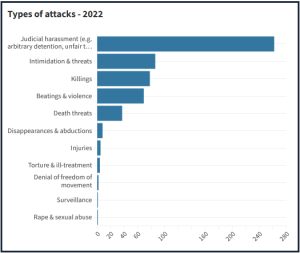 campaigns, arbitrary arrest, strategic lawsuits against public participation (SLAPPs), and physical and sexual violence. Most (86%) of the attacks we tracked in 2022 were non-lethal, which are often precursors to lethal violence and warning signs to States to increase protection efforts.
campaigns, arbitrary arrest, strategic lawsuits against public participation (SLAPPs), and physical and sexual violence. Most (86%) of the attacks we tracked in 2022 were non-lethal, which are often precursors to lethal violence and warning signs to States to increase protection efforts.
Non-lethal attacks are generally left uninvestigated and unpunished, which can have a chilling effect on the work of defenders and promote impunity that feeds further violence where defenders persist in their critical work. The Esperanza Protocol, launched in December 2021 by civil society organisations and experts in international law, provides guidelines based on international human rights law to support the investigation, prosecution and punishment of threats against defenders by governments and ultimately create an enabling environment for the defence of human rights worldwide. While the protocol largely focuses on the duty of States, it also notes business actors must ensure their activities, actions, and omissions do not lead to threats against defenders and address any harms to defender
Peru
Oscar Mollohuanca Cruz was a former mayor of the Espinar district in Peru and a human rights and environmental defender. In 2012, alongside other community members, he raised concerns about environmental contamination and harm to human health related to copper mining in the region.
In 2016, along with two other defenders, he was criminally indicted on charges of endangering public safety, obstruction of public services and disturbing the peace related to his activism and the protests in 2012. The three defenders faced eight years in jail for the first two charges and seven for the third one, in addition to fines of 27,000 EUR (100.000 soles). They were acquitted on 17 July 2017, however on 10 May 2018, the First Criminal Appeals Chamber of the Ica High Court of Justice overturned the acquittal and ordered the trial to be initiated once again.
In November 2021, Oscar participated in the National Campaign of Environmental Defenders in Peru where he shared his concerns about the lack of protection of defenders in the country and the urgent need for protecting the right to defend human rights. On 7 March 2022, Oscar was found dead with injuries on his body.
Judicial harassment
Many governments are not only failing in their duty to protect human rights but also actively targeting defenders through their legal systems or facilitating use of these systems by private actors to target defenders. Judicial harassment, which includes arbitrary detention, unfair trials, and other forms of criminalisation, continues to be prevalent worldwide. It also includes strategic lawsuits against public participation (SLAPPs), lawsuits initiated or brought by business actors against people and groups for exercising their rights to participate in, comment on, or criticise matters of public concern. Judicial harassment causes significant stress and harm to defenders and diverts time away from their human rights work while draining their resources. It can have a chilling effect, deterring others from speaking out against abuse. Jointly, these forms of judicial harassment comprised nearly half (47%) of the cases we tracked in 2022 and 51% of cases since 2015.
Bosnia & Herzegovina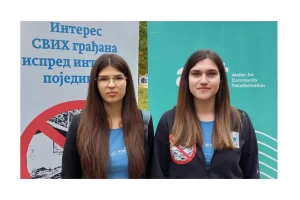
Sunčica Kovačević and Sara Tuševljak are 25-year-old law students who formed a group comprised of local community members and activists organizing against the construction of small hydropower plants in the Kasindolska river in East Sarajevo, Bosnia and Herzegovina. This initiative raised concerns about the environmental and human rights impacts of hydropower plants operated by BUK d.o.o, a subsidiary of Belgian-based company Green Invest. In January 2022, Green Invest brought three defamation lawsuits, which bear the hallmarks of SLAPPs, against Sunčica and Sara and they have been threatened with further legal action.
The Resource Centre sought a response from Green Invest, which stated the lawsuits were filed to stop the defamation against the company. A rejoinder from Riverwatch, EuroNatur, Foundation Atelier for Community Transformation – ACT, Save the Blue Heart of Europe, and Stop Building Small Hydropower Plants on Kasindolska River expressed support for the defenders.
ACT – Foundation for social change
Gendered nature of attacks
During 2022, nearly one-quarter of attacks were against women human rights defenders. While defenders of all genders are targeted due to their human rights work, women human rights defenders challenging both corporate power and patriarchal gender norms often endure specifically gendered attacks. This includes online threats and harassment of a sexualised nature and smear campaigns criticising women for spending time on activism rather than caretaking in the home. In research by the SAGE Fund about women defending their lands, territories, resources and the climate from extractive projects, many women interviewed said the psychological harm from online smear campaigns was one of the most significant and long-term forms of structural harm they face.
These tactics are meant to stigmatise, isolate and silence women defenders. Due to patriarchal power dynamics, women human rights defenders often also face risks in different spheres, including in their societies, communities and families. They may experience discrimination or violence in the movements and organisations they work with, criticism from their families or communities for their human rights work, and intimate partner violence at home. While defenders of any gender face barriers to justice and remedy, these difficulties are compounded for women human rights defenders due to gender-based discrimination and violence, and even more challenging for women facing multiple forms of discrimination on the basis of race, ethnicity, ability and other identities.
Sector overview
Attacks against defenders occur in relation to almost every business sector in every region of the world. The four most dangerous sectors in 2022 related to natural resources. Short term profit-driven extractive approaches which have underpinned the global energy model are core drivers of attacks on defenders and have not provided many of the economic benefits or development promised to communities and countries.
Mining has consistently been the most dangerous sector for defenders since we began tracking in 2015, showing little progress to prevent attacks. Nearly 30% of attacks in 2022 were connected to mining, and the sector is even more dangerous for Indigenous defenders – 41% of attacks against Indigenous peoples in 2022 related to mining.
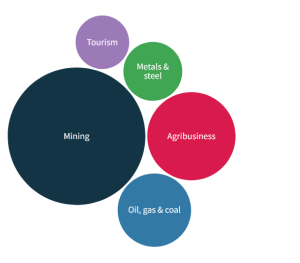
This is particularly concerning given that International Energy Association projections point to a six-fold increase in demand for transition minerals (e.g., copper, cobalt, lithium, nickel, manganese, zinc, as covered in our Transition Minerals Tracker, as well as rare earths) by 2040. In addition, a 2022 study found that half of the world’s resource base for crucial energy transition materials is located on or near Indigenous Peoples’ lands. Lithium mining is of particular concern: according to the study, 85% of current and planned lithium extraction projects are located on or near land managed or inhabited by Indigenous peoples.
Mining for transition minerals, as well as land-intensive renewable energy projects, are already causing widespread abuse of land, water and Indigenous peoples’ rights. Our Transition Minerals Tracker revealed the world’s biggest producers of six key minerals needed for the zero-carbon transition are largely failing to address risks and impacts on local communities, including attacks on civil society organisations and their leaders. This approach to the transition will also continue to fuel opposition, conflict, and result in delays to both projects and achieving our global climate targets. Such conflict has already resulted in at least 369 attacks on defenders related to renewable energy projects since 2015, including 98 killings. In addition, we have tracked at least 148 attacks related to transition mineral mining between 2010 and 2021, making up over a quarter of the 517 attacks recorded with links to renewable energy value chains – from mineral extraction through to installations.
Despite these risks, human rights and environmental defenders are at the forefront of advocating for a rights-respecting, more sustainable energy transition which does not replicate harmful extractive models of past and present. They are also innovating and reimagining the energy sector based on equity. We are seeing a small, but growing, adoption of equity model frameworks where renewable energy companies design projects with Indigenous communities based on the principles of co-ownership and sustainable shared benefit, which is essential for a rights-based and sustainable transition.
Perpetrators of attacks
As many attacks involve collusion between State, private sector and other non-state actors in contexts with high levels of impunity, perpetrators are often difficult to identify. In cases where attacks could be connected with a specific company or a business project (43% of total attacks in 2022), the highest number of attacks related to companies headquartered in India and the United Arab Emirates. Both countries have tried to position themselves as global and environmental leaders and are hosting major multilateral events in 2023 – G20 and COP28, respectively. In addition, Brazil, set to host the G20 presidency in 2024, is the most dangerous country overall for defenders raising concerns about business. This worryingly signals that the countries charged with steering collective action on climate and global economic and financial stability are failing in their duty to protect human rights and to hold companies headquartered in their countries to account when they violate the rights of defenders.
The five companies whose operations, value chains, or business relationships were connected to the highest numbers of attacks in 2022 were JSW Steel Ltd. (India), Otterlo Business Corporation (UAE), TotalEnergies (France, East African Crude Oil Pipeline majority shareholder), Inversiones los Pinares (Honduras), and NagaCorp Ltd and its subsidiary NagaWorld (Cambodia) (more information about the allegations can be downloaded here). These include any attacks against defenders raising human rights concerns about these companies’ operations, value chains, or business relationships, even if the company did not perpetrate the attack directly.
We invited these companies to respond. JSW Steel Ltd. and TotalEnergies responded; their full responses are available here. Otterlo Business Corporation, Inversiones los Pinares, and NagaCorp did not respond.
There are many ways companies can be involved with attacks on defenders, including:
- Calling police or state security forces to disperse a peaceful protest at one of their operation sites;
- Threatening, firing or calling for the arrest of union leaders;
- Cooperating with state repression, such as by providing services or products that enable surveillance of journalists and other defenders; and
- Initiating lawsuits against defenders for defamation, damages or incitement to commit a felony; and
- Lobbying for policies that restrict civic freedoms, such as “anti-protest” laws and actions that lead to criminalisation of defenders.
Less obvious tactics to silence defenders and undermine their rights include providing incentives for some community members to create divisions, obstructing unionisation, disseminating distorted information about projects, lobbying against regulation intended to protect human rights and the environment, and exploiting governance gaps for corporate benefit, among others.
According to the UN Guiding Principles on Business and Human Rights and subsequent guidance, if business actors are causing or contributing human rights abuse affecting defenders, their responsibility is clear-cut: end the abuse and address and remedy any harm. Even in cases where there are no apparent direct links between companies or investors and attacks, business actors with operations, supply chains, business relationships and/or investments are expected to proactively use their leverage to promote respect for the rights of defenders and civic freedoms. In addition, restrictions on civic freedoms signal riskier contexts for investment and economic activity and create an “information black box” for companies and investors, making it more difficult to engage in robust human rights due diligence.
Other non-state actors involved with attacks on defenders include illegal miners, loggers and organised criminal groups. Illegal mining and logging – extraction of these natural resources undertaken without appropriate land rights, exploration licenses or transportation and other permits – are often associated with significant human rights abuses, environmental harm and corruption. Lack of transparency in precious metal supply chains, weak regulation in both producing and consumer countries, the potential for significant profit, and high levels of impunity fuel exploitation in this sector.
People who raise concerns about illegal mining and logging are protecting their land, clean water, and biodiversity; combating pollution and deforestation; and helping to address the climate crisis. They often face threats and violence from those involved with this illegal exploitation of resources. While companies are not direct perpetrators of these attacks, these illegally extracted resources often end up in their supply chains, showing a need for stronger human rights due diligence among sourcing companies.
State actors
Among the cases we tracked where information was publicly available about alleged perpetrators of attacks, the police were named most frequently, followed by the judicial system. The data we uncovered shows how governments are failing in their duty to protect rights and, further, are actively using agents and arms of the State – police, armed forces and the judicial system – to try to silence and stop human rights and environmental protection work. According to the UN Working Group on Business and Human Rights, governments have a duty to investigate, punish and redress all forms of threats and attacks against human rights defenders in a business context, yet many have a vested interest in these attacks happening under the radar given their involvement. In addition, very few States are collecting official data on lethal and non-lethal attacks.
Advances in legislation and voluntary commitments
Over the past two years, there have been several significant developments related to business and human rights defenders in both soft and hard law, driven by years of civil society advocacy. In 2021, the seminal interpretation of UNGPs by the UN Working Group on Business and Human Rights clarified the normative responsibility of business actors to respect the rights of defenders and highlighted the critical role played by defenders in human rights due diligence processes and in enabling business enterprises to understand the concerns of affected stakeholders. In addition, the Escazú Agreement – the first legally binding instrument in the world to include provisions on environmental human rights defenders and the first environmental agreement adopted in Latin America and the Caribbean – entered into force.
Milestones in 2022 and 2023 include:
- Adoption of General Recommendation 39 on Indigenous Women and Girls by the Committee on the Elimination of Discrimination Against Women – the first language in a binding international treaty focused on the rights of Indigenous Women and Girls. The recommendation also acknowledges that Indigenous women and girls are at the forefront of demand and action for a clean, safe, healthy and sustainable environment.
- Inclusion of strengthened stakeholder consultation requirements and the language of human rights defenders in the European Union corporate sustainability due diligence legislation text approved by the European Parliament’s Committee on Legal Affairs (JURI) on 25 April 2023, making it more likely that the final text of this historic corporate accountability legislation could include requirements related to defenders. At the same time, the language in the JURI committee’s position is in some ways weaker than the text proposed by lead MEP Lara Wolters in her earlier draft report. The EU Council’s General Approach adopted by Member States on 1 December 2022 also includes language on defenders and explicitly mentions them as stakeholders whose rights or interests could be affected by corporate activity.
- Appointment of former UN Special Rapporteur on Human Rights Defender Michel Forst as the first-ever Special Rapporteur on Environmental Defenders under the Aarhus Convention, which protects the right to live in a healthy environment in the European Union. This is the first such mechanism specifically safeguarding environmental defenders to be established within a legally binding framework either under a UN system or other intergovernmental structure.
- Consultations on the revision of the OECD Guidelines on Multinational Enterprises, in which civil society groups have urged strengthening the text on reprisals and explicitly including “human rights defenders”.
- Several corporate and government commitments to the protection of civic space and human rights defenders as part of the US Summit for Democracy.
These and other developments signal momentum towards recognition of the need to prevent and address attacks against defenders raising concerns about business-related harms, including among companies themselves. For example, Hewlett Packard Enterprises enacted a policy commitment to respect the rights of marginalised groups (including defenders) in January 2022, and TotalEnergies published information about the actions it has taken with respect to human rights defenders and freedom of expression in Uganda (see also TotalEnergies EP Uganda’s human rights policy). In addition, the Voluntary Principles Initiative, a multi-stakeholder initiative that guides oil, gas and mining companies on how to conduct their security operations in a manner that respects human rights, will release guidance on defenders in 2023.
Recommendations
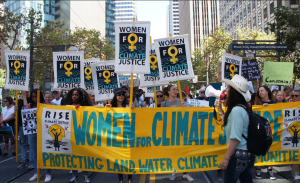
The scale and severity of attacks on people across the globe protecting our rights and environment clearly show the need for urgent action. We call on States to fulfil their duty to protect the rights of defenders and for business actors to respect the rights of defenders by acting on these recommendations.
Recommendations for states
- Pass and implement legislation recognising the right to defend rights and the vital role of defenders, both individual and collective, in promoting human rights, sustainable development, and a healthy environment and committing to zero-tolerance for attacks (more detail recommendations available here). This must include legal recognition of the specific rights of Indigenous and Afro-descendant peoples (more detailed recommendations available here).
- Accede to or, if already ratified, fully implement key international and regional standards that protect the civic freedoms of defenders, including those raising concerns about harmful business practice.
- Pass national laws to implement the UNGPs, including mandatory human rights due diligence legislation, and consult with defenders at all stages of this process. This legislation should mandate that business actors engage in ongoing safe and effective consultation with defenders and other rightsholders potentially or directly affected, should be an integral part of climate mitigation and adaptation plans, and should be aligned with the UN working group’s guidance on defenders and other key standards mentioned above (more detailed recommendations available here).
- Collect and report data on non-lethal and lethal attacks to inform more effective protection mechanisms and passing anti-SLAPP legislation to prevent companies silencing defenders (more detailed recommendations available here).
- Ensure effective remedy for violations when they occur, including by strengthening judicial systems to hold businesses accountable for acts of retaliation against defenders and actively participating in investigation and prosecution of those responsible for attacks.
- Move towards supporting the adoption of a binding United Nations treaty on business and human rights and ensure that it explicitly recognises the risks defenders face and their right to defend human rights.
Recommendations for companies
- Adopt and implement policy commitments which recognise the valuable role of defenders, reference specific risks to defenders, ensure effective engagement and consultation with defenders at all stages of the due diligence process and commit to zero-tolerance for reprisals throughout the company’s operations, supply chains and business relationships.
- Create public commitments to respect fundamental rights with particular attention to rights often abused in connection with attacks on defenders, such as violations of land and Indigenous peoples’ rights.
- Engage in and report on the results of human rights and environmental due diligence that integrates a gender perspective throughout and ensure effective access to remedy for those harmed by business activity, in accordance with the UNGPs, the UN Working Group’s guidance on ensuring respect for defenders, and the UN Working Group’s gender guidance.
- Recognise that Indigenous defenders are disproportionately at risk, respect Indigenous peoples’ rights, grounded in their rights to self-determination; lands, territories, and resources; and right to free, prior, and informed consent, including their right to define the process by which FPIC is achieved and to withhold consent (more detailed recommendations available here).
- Publicly recognise that defenders have a right to defend human rights, are essential allies in assisting businesses to adhere to their responsibilities under the UNGPs.
Recommendations for investors
- Publish a public human rights policy which recognises the valuable role of defenders in identifying risks associated with business activities and commits to a zero-tolerance approach to attacks against defenders. Clearly communicate the human rights expectations included in this policy to portfolio companies, including that companies:
‣ disclose human rights and environment-related risks;
‣ engage in ongoing consultation with communities, workers and defenders;
‣ have policies and processes to respect Indigenous peoples’ rights (including land rights and free, prior and informed consent);
‣ respect the rights of defenders; and
‣ ensure effective access to remedy when harm occurs. - Undertake rigorous human rights and environmental due diligence that integrates a gender perspective throughout and review potential investees for any past involvement with retaliation. Avoid investing in companies with this track record.
- Use leverage with investee companies which cause, contribute to, or are directly linked to human rights and environmental harms, including attacks on defenders, so that the company mitigates negative impacts and provides access to remedy to those affected.
Related posts:
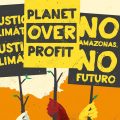
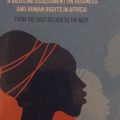 United Nations Guiding Principles on Business and Human Rights (UNGPs10+) have been released in Accra, Ghana.
United Nations Guiding Principles on Business and Human Rights (UNGPs10+) have been released in Accra, Ghana.
 Human rights defenders show remarkable courage in the face of attacks and killings – new report
Human rights defenders show remarkable courage in the face of attacks and killings – new report
 #COP27: HUMAN RIGHTS ADVOCATES URGE PARTIES TO INCREASE RECOGNITION AND PROTECTION OF ENVIRONMENTAL AND LAND DEFENDERS.
#COP27: HUMAN RIGHTS ADVOCATES URGE PARTIES TO INCREASE RECOGNITION AND PROTECTION OF ENVIRONMENTAL AND LAND DEFENDERS.
 Human Rights Defenders not safe in Uganda – Unwanted Witness report
Human Rights Defenders not safe in Uganda – Unwanted Witness report
You may like
NGO WORK
Climate wash: The World Bank’s Fresh Offensive on Land Rights
Published
3 days agoon
November 13, 2025
Climate wash: The World Bank’s Fresh Offensive on Land Rights reveals how the Bank is appropriating climate commitments made at the Conference of the Parties (COP) to justify its multibillion-dollar initiative to “formalize” land tenure across the Global South. While the Bank claims that it is necessary “to access land for climate action,” Climatewash uncovers that its true aim is to open lands to agribusiness, mining of “transition minerals,” and false solutions like carbon credits – fueling dispossession and environmental destruction. Alongside plans to spend US$10 billion on land programs, the World Bank has also pledged to double its agribusiness investments to US$9 billion annually by 2030.
This report details how the Bank’s land programs and policy prescriptions to governments dismantle collective land tenure systems and promote individual titling and land markets as the norm, paving the way for private investment and corporate takeover. These reforms, often financed through loans taken by governments, force countries into debt while pushing a “structural transformation” that displaces smallholder farmers, undermines food sovereignty, and prioritizes industrial agriculture and extractive industries.
Drawing on a thorough analysis of World Bank programs from around the world, including case studies from Indonesia, Malawi, Madagascar, the Philippines, and Argentina, Climatewash documents how the Bank’s interventions are already displacing communities and entrenching land inequality. The report debunks the Bank’s climate action rhetoric. It details how the Bank’s efforts to consolidate land for industrial agriculture, mining, and carbon offsetting directly contradict the recommendations of the IPCC, which emphasizes the protection of lands from conversion and overexploitation and promotes practices such as agroecology as crucial climate solutions.
Read full report: Climatewash: The World Bank’s Fresh Offensive on Land Rights
Source: The Oakland Institute
Related posts:

 30 civil society organizations have written to the World Bank Group demanding to publicly disclose the Africa Energy Approach paper.
30 civil society organizations have written to the World Bank Group demanding to publicly disclose the Africa Energy Approach paper.
 World Bank’s new scheme to privatize land in the developing world exposed
World Bank’s new scheme to privatize land in the developing world exposed
 World Bank is backing dozens of new coal projects, despite climate pledges
World Bank is backing dozens of new coal projects, despite climate pledges
 Communities Under Siege: New Report Reveals World Bank Failures in Safeguard Compliance and Human Rights Oversight in Tanzania
Communities Under Siege: New Report Reveals World Bank Failures in Safeguard Compliance and Human Rights Oversight in Tanzania
NGO WORK
Africa’s Land Is Not Empty: New Report Debunks the Myth of “Unused Land” and Calls for a Just Future for the Continent’s Farmland
Published
3 days agoon
November 13, 2025
A new report challenges one of the most persistent and harmful myths shaping Africa’s development agenda — the idea that the continent holds vast expanses of “unused” or “underutilised” land waiting to be transformed into industrial farms or carbon markets.
Titled Land Availability and Land-Use Changes in Africa (2025), the study exposes how this colonial-era narrative continues to justify large-scale land acquisitions, displacements, and ecological destruction in the name of progress.
Drawing on extensive literature reviews, satellite data, and interviews with farmers in Zambia, Mozambique, South Africa, and Zimbabwe, the report systematically dismantles five false assumptions that underpin the “land abundance” narrative:
-
That Africa has vast quantities of unused arable land available for cultivation
-
That modern technology can solve Africa’s food crisis
-
That smallholder farmers are unproductive and incapable of feeding the continent
-
That markets and higher yields automatically improve food access and nutrition
-
That industrial agriculture will generate millions of decent jobs
Each of these claims, the report finds, is deeply flawed. Much of the land labelled as “vacant” is, in reality, used for grazing, shifting cultivation, foraging, or sacred and ecological purposes. These multifunctional landscapes sustain millions of people and are far from empty.
The study also shows that Africa’s food systems are already dominated by small-scale farmers, who produce up to 80% of the continent’s food on 80% of its farmland. Rather than being inefficient, their agroecological practices are more resilient, locally adapted, and socially rooted than the industrial models promoted by external donors and corporations.
Meanwhile, the promise that industrial agriculture will lift millions out of poverty has not materialised. Mechanisation and land consolidation have displaced labour, while dependency on imported seeds and fertilisers has trapped farmers in cycles of debt and dependency.
A Continent Under Pressure
Beyond these myths, the report reveals a growing land squeeze as multiple global agendas compete for Africa’s territory: the expansion of mining for critical minerals, large-scale carbon-offset schemes, deforestation for timber and commodities, rapid urbanisation, and population growth.
Between 2010 and 2020, Africa lost more than 3.9 million hectares of forest annually — the highest deforestation rate in the world. Grasslands, vital carbon sinks and grazing ecosystems, are disappearing at similar speed.
Powerful actors — from African governments and Gulf states to Chinese investors, multinational agribusinesses, and climate-finance institutions — are driving this race for land through opaque deals that sideline local communities and ignore customary tenure rights.
A Call for a New Vision
The report calls for a radical shift away from high-tech, market-driven, land-intensive models toward people-centred, ecologically grounded alternatives. Its key policy recommendations include:
-
Promoting agroecology as a pathway for food sovereignty, ecological regeneration, and rural livelihoods.
-
Reducing pressure on land by improving agroecological productivity, cutting food waste, and prioritising equitable distribution.
-
Rejecting carbon market schemes that commodify land and displace communities.
-
Legally recognising customary land rights, particularly for women and Indigenous peoples.
-
Upholding the principle of Free, Prior, and Informed Consent (FPIC) for all land-based investments.
This report makes it clear: Africa’s land is not “empty” — it is lived on, worked on, and cared for. The future of African land must not be dictated by global capital or outdated development theories, but shaped by the people who depend on it.
Download the Report
Read the full report Land Availability and Land-Use Changes in Africa (2025) to explore the evidence and policy recommendations in detail.
Related posts:

 Financial Institutions from Africa have made a monumental commitment of $100 billion to Africa’s green industrialization, a decision of immense significance that has the potential to shape Africa’s future.
Financial Institutions from Africa have made a monumental commitment of $100 billion to Africa’s green industrialization, a decision of immense significance that has the potential to shape Africa’s future.
 Africa adopts the Africa Climate Innovation Compact (ACIC) Declaration to drive the continent towards innovative climate solutions.
Africa adopts the Africa Climate Innovation Compact (ACIC) Declaration to drive the continent towards innovative climate solutions.
 One in three people sleeps on an empty stomach – World Bank Report.
One in three people sleeps on an empty stomach – World Bank Report.
 Transforming Africa’s livestock sector is key to food security-Report
Transforming Africa’s livestock sector is key to food security-Report
NGO WORK
Discover How Foreign Interests and Resource Extraction Continue to Drive Congo’s Crisis
Published
4 days agoon
November 12, 2025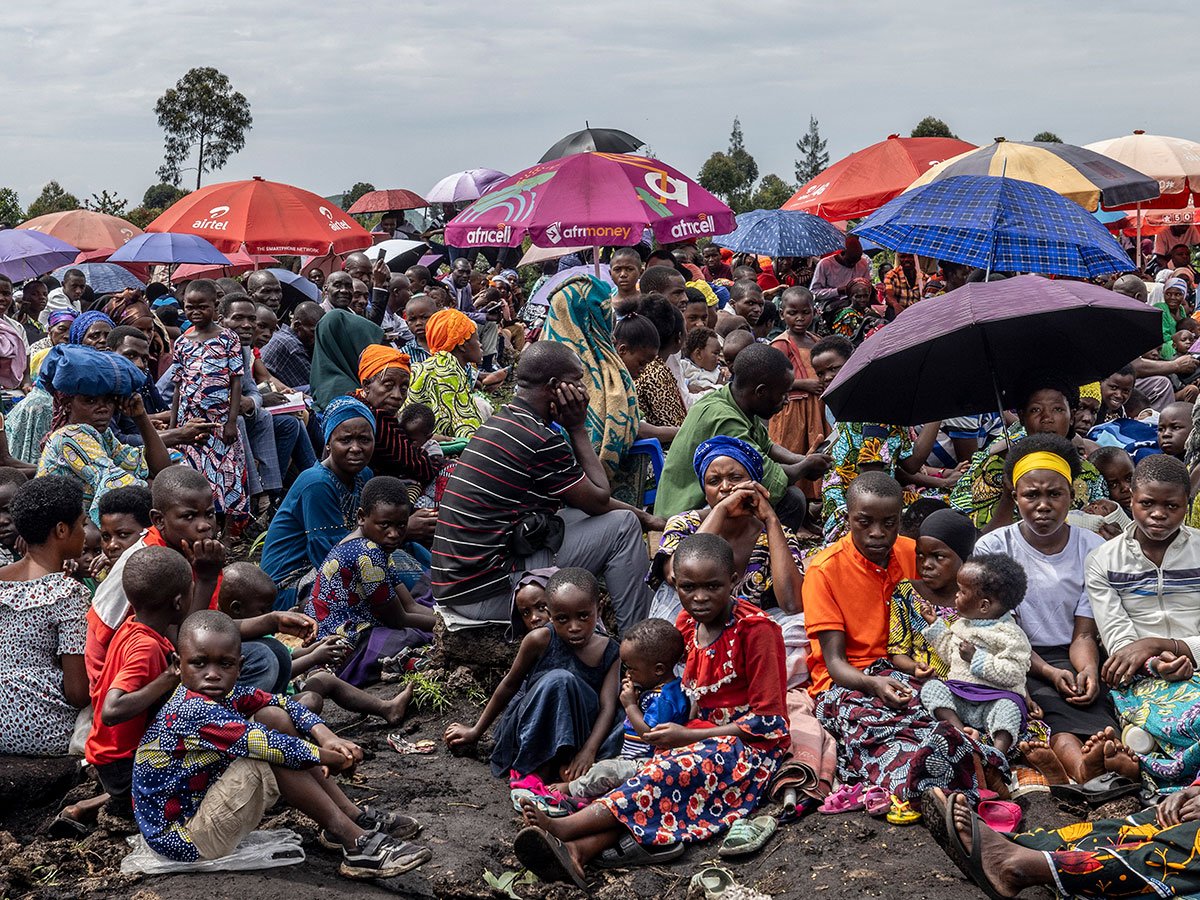
Whereas Donald Trump hailed the “peace” agreement between Rwanda and DRC as marking the end of a deadly three-decade war, a new report from the Oakland Institute, Shafted: The Scramble for Critical Minerals in the DRC, exposes it as the latest US maneuver to control Congolese critical minerals.
Under the Guise of Peace
After three decades of deadly wars and atrocities, the June 2025 “peace” deal between Rwanda and the Democratic Republic of the Congo (DRC) lays bare the United States’ role in entrenching the extraction of minerals under the guise of diplomacy. For decades, US backing of Rwanda and Uganda has fueled the violence, which has ripped millions of Congolese lives apart while enabling the looting of the country’s mineral wealth. Today, Washington presents itself as a broker of peace, yet its longstanding support for Rwanda made it possible for M23 to seize territory, capture key mining sites, and forced Kinshasa to the negotiation table with hands tied behind its back. By legitimizing Rwanda’s territorial advances, the US-brokered agreement effectively rewards aggression while sidelining accountability, justice for victims, and the sovereignty of the Congolese people.
The incorporation of “formalized” mineral supply chains from eastern DRC to Rwanda exposes the pact’s true aim: Securing access to and control over minerals under the guise of diplomacy and “regional integration.” Framed as peacemaking, this is part of United States’ broader geopolitical struggle with China for control over critical resources. Far from fostering peace – over a thousand civilians have been killed since the deal was signed while parallel negotiations with Rwanda’s rebel force have collapsed – this arrangement risks deepening Congo’s subjugation. Striking deals with the Trump administration and US firms, the DRC government is surrendering to a new era of exploitation while the raging war continues, driving the unbearable suffering of the Congolese people.
Introduction
The conflict in eastern DRC, which dates back three decades to the aftermath of the 1994 Rwandan genocide and subsequent Congo Wars, has claimed over six million lives, displaced millions more, and inflicted widespread suffering. Since late 2021, Rwanda and its proxy militia, M23, have stormed through mineral-rich lands and regional capitals, inflicting brutal violence and triggering mass displacement. While billions of dollars in natural resources are extracted from the area, Congolese communities toil in extreme poverty.
On June 27, 2025, a “peace” agreement was signed between Rwanda and the DRC under the auspices of the Trump administration, with diplomatic assistance from Qatar.1 The deal included pledges to respect the territorial integrity of both countries, to promote peaceful relations through the disarmament of armed groups, the return of refugees, and the creation of a joint security mechanism. A key clause commits the countries to launch a regional economic integration framework that would entail “mutually beneficial partnerships and investment opportunities,” specifically for the extraction of the DRC’s mineral wealth by US private interests.
Placing the deal in a historical perspective – after three decades of conflict and over seven decades of US chess game around Congolese minerals – this report examines its implications for the Congolese people as well as the interests involved in the plunder of the country’s resources.
The report begins by retracing 30 years of war, fueled by the looting of Congo’s mineral wealth and devastating for the people of eastern DRC. It then examines how US policy in Central Africa, from the Cold War to the present, has been shaped by its interest in Congolese minerals, sustained alliances with Rwanda and Uganda, and a consistent pattern of overlooking atrocities in support of these allies.
The report then analyses the implications of the regional economic integration aspect of the deal, which aims to link mineral supply chains in the DRC and Rwanda with US investors. The last sections examine the prospect for lasting peace and security resulting from the deal and the impact of growing involvement of US private actors in DRC and Rwanda.
Original Source: Oakland Institute
Related posts:

 Profit off Peace? Meet the Corporations Poised to Benefit from the DRC Peace Deal
Profit off Peace? Meet the Corporations Poised to Benefit from the DRC Peace Deal
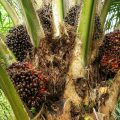 DR Congo: RIAO-RDC calls for the immediate release of four leaders from the community of Mwingi who were arrested after a peaceful protest against the oil palm plantation company PHC
DR Congo: RIAO-RDC calls for the immediate release of four leaders from the community of Mwingi who were arrested after a peaceful protest against the oil palm plantation company PHC
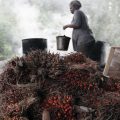 DR Congo oil palm company bankrolled by development banks unleashes wave of violence against villagers after peaceful protests
DR Congo oil palm company bankrolled by development banks unleashes wave of violence against villagers after peaceful protests
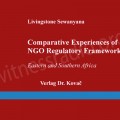 Operations of civil society organizations will continue to be stifled until government understands their work – New Book.
Operations of civil society organizations will continue to be stifled until government understands their work – New Book.

“Vacant Land” Narrative Fuels Dispossession and Ecological Crisis in Africa – New report.

Uganda’s Army is on the spot for forcibly grabbing land for families in Pangero Chiefdom in Nebbi district.

Climate wash: The World Bank’s Fresh Offensive on Land Rights

Africa’s Land Is Not Empty: New Report Debunks the Myth of “Unused Land” and Calls for a Just Future for the Continent’s Farmland

StopEACOP Coalition warns TotalEnergies and CNOOC investors of escalating ‘financial and reputational’ Risks

Seed Boot Camp: A struggle to conserve local and indigenous seeds from extinction.

Know Your Land rights and environmental protection laws: a case of a refreshed radio program transferring legal knowledge to local and indigenous communities to protect their land and the environment at Witness Radio.

Failed US-Brokered “Peace” Deal Was Never About Peace in DRC

Innovative Finance from Canada projects positive impact on local communities.
Over 5000 Indigenous Communities evicted in Kiryandongo District
Petition To Land Inquiry Commission Over Human Rights In Kiryandongo District
Invisible victims of Uganda Land Grabs
Resource Center
- REPARATORY AND CLIMATE JUSTICE MUST BE AT THE CORE OF COP30, SAY GLOBAL LEADERS AND MOVEMENTS
- LAND GRABS AT GUNPOINT REPORT IN KIRYANDONGO DISTRICT
- THOSE OIL LIARS! THEY DESTROYED MY BUSINESS!
- RESEARCH BRIEF -TOURISM POTENTIAL OF GREATER MASAKA -MARCH 2025
- The Mouila Declaration of the Informal Alliance against the Expansion of Industrial Monocultures
- FORCED LAND EVICTIONS IN UGANDA TRENDS RIGHTS OF DEFENDERS IMPACT AND CALL FOR ACTION
- 12 KEY DEMANDS FROM CSOS TO WORLD LEADERS AT THE OPENING OF COP16 IN SAUDI ARABIA
- PRESENDIANTIAL DIRECTIVE BANNING ALL LAND EVICTIONS IN UGANDA
Legal Framework
READ BY CATEGORY
Newsletter
Trending
-

 MEDIA FOR CHANGE NETWORK2 weeks ago
MEDIA FOR CHANGE NETWORK2 weeks agoReport reveals ongoing Human Rights Abuses and environmental destruction by the Chinese oil company CNOOC
-

 SPECIAL REPORTS AND PROJECTS2 weeks ago
SPECIAL REPORTS AND PROJECTS2 weeks agoThe Environmental Crisis Is a Capitalist Crisis
-

 MEDIA FOR CHANGE NETWORK3 days ago
MEDIA FOR CHANGE NETWORK3 days ago“Vacant Land” Narrative Fuels Dispossession and Ecological Crisis in Africa – New report.
-

 SPECIAL REPORTS AND PROJECTS2 weeks ago
SPECIAL REPORTS AND PROJECTS2 weeks agoGlobal use of coal hit record high in 2024
-

 MEDIA FOR CHANGE NETWORK2 weeks ago
MEDIA FOR CHANGE NETWORK2 weeks agoLands ministry rejects call to save over 300 Masaka residents facing eviction
-

 MEDIA FOR CHANGE NETWORK5 days ago
MEDIA FOR CHANGE NETWORK5 days agoSeed Sovereignty: Most existing and emerging laws and policies on seeds are endangering seed saving and conservation on the African continent.
-

 MEDIA FOR CHANGE NETWORK3 days ago
MEDIA FOR CHANGE NETWORK3 days agoUganda’s Army is on the spot for forcibly grabbing land for families in Pangero Chiefdom in Nebbi district.
-

 NGO WORK4 days ago
NGO WORK4 days agoDiscover How Foreign Interests and Resource Extraction Continue to Drive Congo’s Crisis

